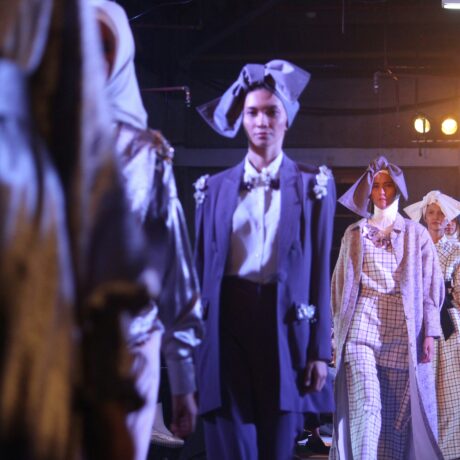Interview with Sara Arnold: Part 4 in the Power of Influence series.
This month’s Power of Influence takes us in a bit of a different direction. On a 15 minute walk from London Euston to London Kings Cross, Fashion Revolution co-founder Orsola de Castro and renowned fashion critic and columnist Sarah Mower spoke with Sara Arnold of Extinction Rebellion (and Higher Studio) about the recent protests, the aim of the movement and the next steps in their fight for climate justice. Shortly after this interview, the UK Parliament declared a climate change emergency.
A little bit of context: On Saturday April 27th, during Fashion Revolution Week and towards the end of Extinction Rebellion’s 2 week occupation of Central London, Slow Factory hosted “Study Hall: Sustainability as a Culture”. The event (in its first international edition) was held in London, UK. Before the event, the Fashion Revolution team along with Sara Arnold, Sarah Mower, speakers, attendees and supporters took a walk to discuss the current happenings.
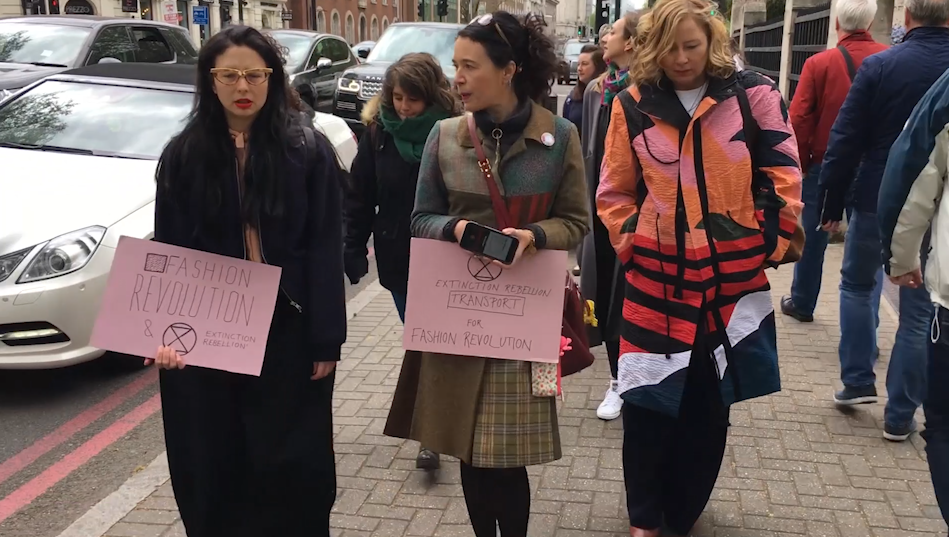
Here’s what was said:
Orsola de Castro: So the response to the protests… people are really prepared to put themselves out there. There were over 1000 arrests you say. Did you find that the overall response was positive?
SA: There has been criticism of the tactics used, there has been criticism of disruption, but that’s not we’re worried about. We want people to hear our demands, that’s what people should be focused on. I think we are making progress on that. Everyone is talking about climate change in a different way. Talking about it as an emergency. It doesn’t matter if they don’t agree with how we’ve gone about doing things. As long as it works.
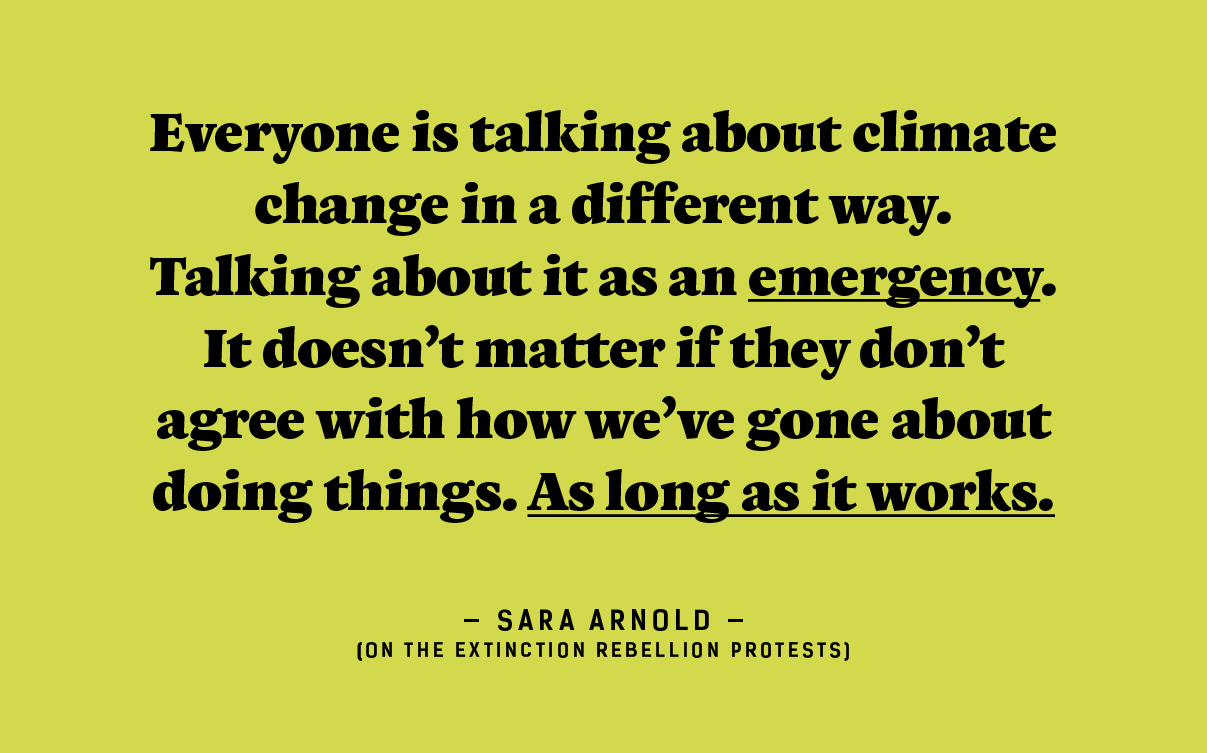
OdC: I’ve found that one of the reasons why we (Fashion Revolution) wanted to do this is the symbolism of joining hands. Even if everyone has a different way of doing things. The fact that the message is one of urgency is what we want to show. We need to all join together.
Could you tell me a little about how you guys started?
SA: Yes, so Extinction Rebellion were a group called Rising Up which started, in 2016, as a group of activists who wanted to theorise how they would go about creating this social change that we needed. They researched and put into practice different tactics. A member of Extinction Rebellion, Roger Hallam, who is currently doing his PhD at King’s College on these issues, one of the things he did was engage with an activist group at King’s that for years had been trying to get the University to disinvest from fossil fuel. They decided to stage a hunger strike. They were told that this process, even just the bureaucracy of disinvesting from fossil fuels would take a year to sort out. They said ‘okay, so let’s just try it’. So they went on hunger strike.
Sarah Mower: Because the university was investing in fossil fuels?
SA: Exactly. The whole process, from start to finish, from them going on hunger strike to all the investment coming out was 2 weeks. When they were told it would take years. So it just goes to show that direct action makes change. People do what they think is not possible when they are faced with disaster.
OdC: When I went to the first extinction rebellion meeting, you were talking about in war and in emergency, people make things happen. So the factories go from producing kitchenware to producing arms. When it is a state of emergency, historically, we’ve known citizens and organisations to take action pretty rapidly.
SA: Exactly. Now we have to get this declaration through to them so they can act.
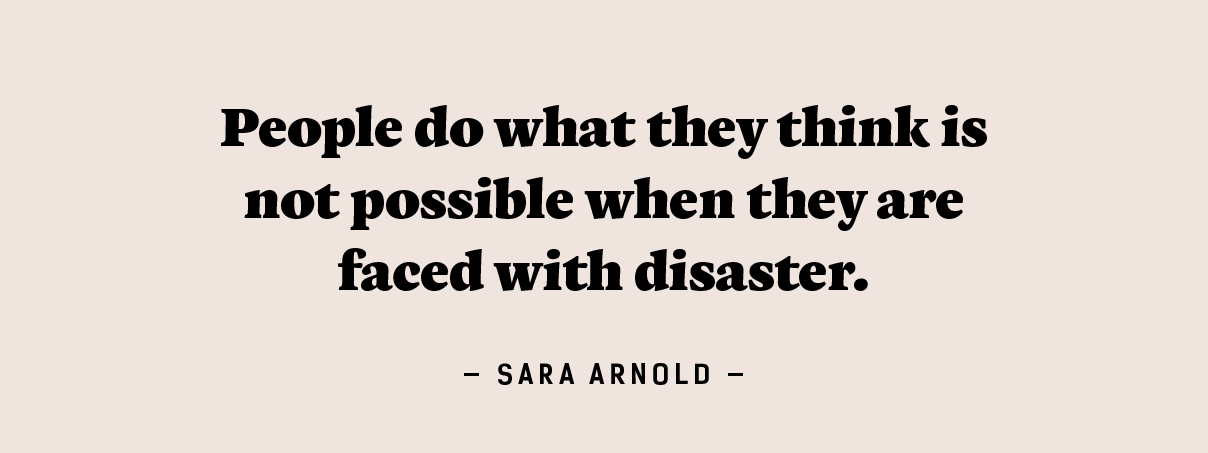
OdC: And so what about the involvement of Greta (Thunberg)?
SA: Greta was there when we held the Declaration of Rebellion on the 31st of October 2018. So we’ve had her support since the beginning. It’s really great that she came back at this time for the protests.
SM: She has changed everything.
OdC: She has changed everything.
OdC: You have other hubs in other countries, do you find there are other meaningful partnerships with local organisations in the rest of the world? Are you finding that people want to join you or do you find that they are hesitant to do so?
SA: The International Rebellion was in 33 countries. We have groups set up in 49 countries.
OdC: So like Fashion Revolution, you are de-centralised in the sense that it is volunteer run and people start their own groups.
SA: Yes. So we have 200 groups in the UK alone. The groups outside of the UK can have different demands to ours. They can adapt what we have done to respond to their own political situation. We’re so fortunate here to have police that are peaceful. And we have to use that privilege. We have a really engaged group in Ghana but if they did the same thing we are doing, they are looking at being arrested and then disappearing. It’s important for us to have solidarity with them. We keep a list of the names of those people so if anything does happen, we can protect them. It really interesting to get into that and see how we can help to take it further, internationally.
OdC: There are issues when you are a global group and you are dealing with law in different countries, even though the message is the same. Its important to recognise that.
OdC: How do you deal with citizens apathy out of fear? That people are so scared over what will happen, that they tend to go home and not know where to start.
SA: We need to really bring about this sense of urgency. That this is an absolute emergency. I feel its important to make people understand what the consequences are. We are talking about mass starvation, the death of billions of people if we reach a certain tipping point. Starvation is something we are really heading towards. We have 30 to 40 years left of fertile soil in this country, other countries are already hitting that. Let alone all the other problems. We are so dangerously close to hitting the tipping point.
Everyone is going to react to this differently. Everyone will go through a process of grief. And for a lot of people, grief will mean denial. That’s fine, you just have to feel compassion towards that. With extinction rebellion, what we are saying, is that when you give people the truth, a certain percent of the population, we think between 1 and 3% will rise up. And that is all we are aiming for. We need that 1 to 3% to rise up, to bring this to the governments and to take control.
OdC: And speak truth to power.
SA: Yes. We’ve been trying for the last 30 years to give people this positive message that we hope people will engage with and that great, but we don’t have time for that now.
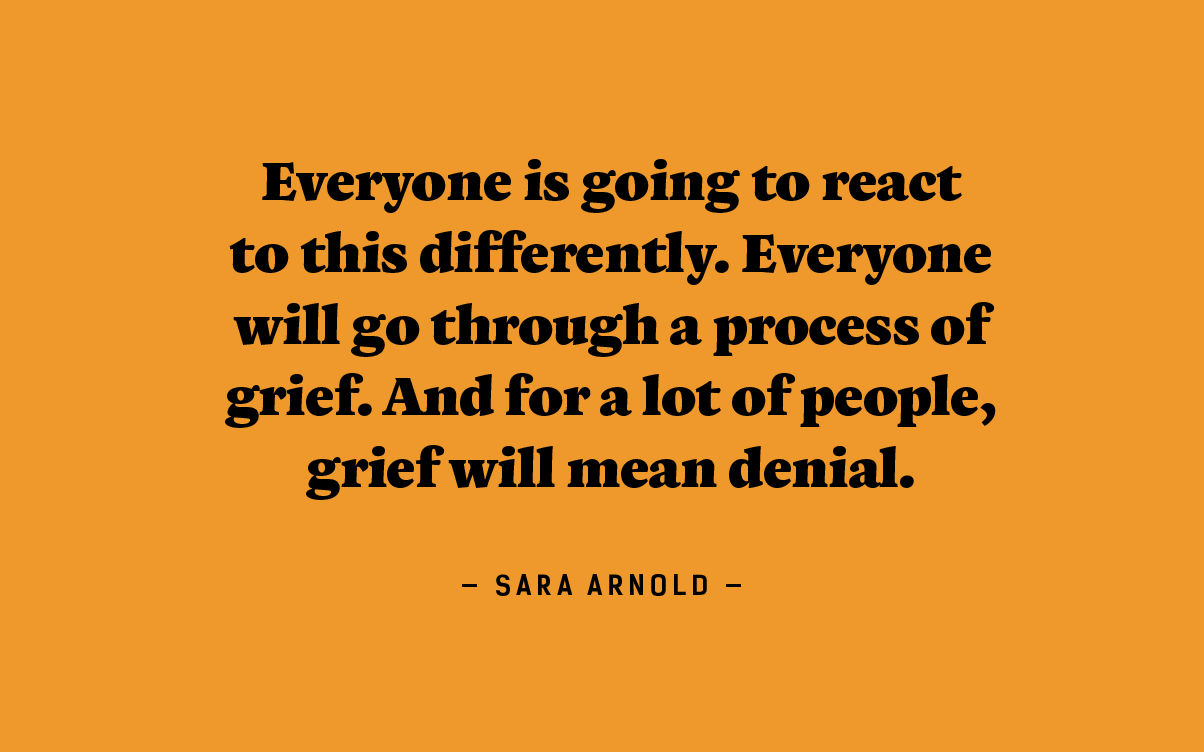
SM: So what do you think when Greta Thunberg stands in front of Michael Gove and he acts all Mea culpa. How do we hold him to account and get through real change?
SA: It’s a difficult question.
SM: If we’re talking about footfalls and governmental change.
SA: This is stage 1 of the rebellion. We can rise up and be bigger next time if we need to. I think. As we are doing that, we are waking people up to this emergency and its not something you can turn the clock back on. I think sooner or later the government will have to act.
OdC: I thought Mary Creagh was very honest at the recent Fashion Question Time when she was saying that we cannot do 2025 but working towards 2050, hoping it will gradually get faster and easier.
‘We aren’t going to get to net zero by 2025. The science will tell us what to do to get to net zero by 2050, and then in five years’ time to 2040 and then we’ll aim to get there for 2035. We have wasted the last 10 years, we’ve had no new policy in this country to change behaviour and we’ve done some policy mistakes along the way.’ Mary Creagh, Fashion Question Time at the V&A
SA: I think that we have to hit 2025. The Arctic is melting. We could lose it in a few years. That could be the tipping point that takes us into oblivion. We have to set our targets at something that seems impossible because then we are forced to look at system change. It is not about what we can do within the existing system, we have to look beyond that and listen to the science.
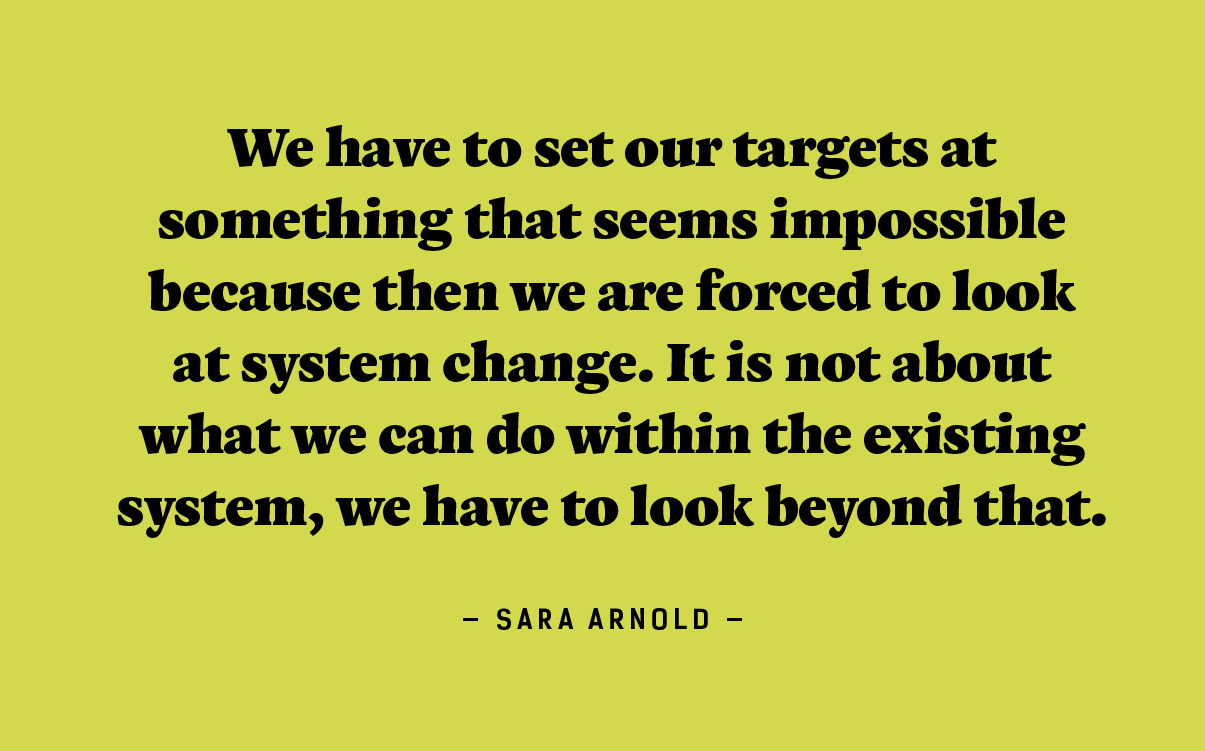
OdC: The science…the science corroborates that if we did stop now, it would get worse before it gets better.
SA: That’s the thing, pollution is currently cooling the earth. We are now 1.1 degrees warmer than we were during pre-industrial times. We need to keep ourselves below 1.5 if we are to avoid the most catastrophic consequences. BUT..If we slam on the brakes right now, the pollution will clear, causing an abrupt rise in temperature. This increase has been predicted to be between 0.5 and 1.1 degrees and so we may well have already used the carbon budget associated with 1.5 degrees of global heating. And that also puts us dangerously close to tipping points that will lead us into a so called ‘hot-house earth pathway’ of runaway climate breakdown. Its predicted that we reach this tipping point at around 2 degrees of global heating. Prof. Jem Bendell released a paper, ‘Deep Adaptation’, that puts together all the science to conclude where it is we are headed. His conclusion is that the collapse of civilisation is soon and inevitable. That immense catastrophe is likely and extinction possible.
‘I have chosen to interpret the information as indicating inevitable collapse, probable catastrophe and possible extinction.’ – Prof. Jem Bendell, Deep Adaptation: A Map for Navigating Climate Tragedy
So that is why we have to think about how we are going to adapt our culture, how we can reconnect with the thought of what it means to have a fulfilled life. What is important to us? This is why we say it’s not really about providing hope to people its saying we just need the courage to get through this and do what is necessary.
OdC: If we look at precedence, historically, the last time there was a massive mobilisation was in the 60’s. I often joke that the peace sign embroidered on jeans practically stopped the Vietnam war but it essentially sparked consumerism.
SM: Its true and now that generation, who are now grandparents, see their grandchildren protesting against it. It’s something I find very moving.
Further reading:
BBC: UK Parliament declares climate change emergency
Fashion Revolution Blog: Fashion Question Time at the V&A
The Guardian: Human society under urgent threat from loss of Earth’s natural life
Open Democracy: Britain just declared a climate emergency. What happens next?
IPCC: Special Report: Global Warming of 1.5 ºC
Life Worth: Deep Adaptation: A Map for Navigating Climate Tragedy
The Library: Study Hall: London Central Saint Martins
Check back every month for more in the Power of Influence series. We’ll post a new entry on the last day of each month throughout 2019. If you think there is someone we should be talking to, drop us a line on instagram.
We host Fashion Revolution Week in April of every year. This year kicked off on the 22nd of April. Throughout the week we encouraged people to ask brands ‘who made my clothes’ in hopes of shining a light on the unknowns of the fashion industry. By doing this, we hope to shift the focus from consumers to brands, and to all the hands involved, be it producers, workers, farmers or otherwise. We track the reach and impact of collaborators throughout Fashion Revolution Week and use the findings to fight for change worldwide, through government and policy. We are able to do this through the generous support of people like you. Please consider donating. Thank you.




